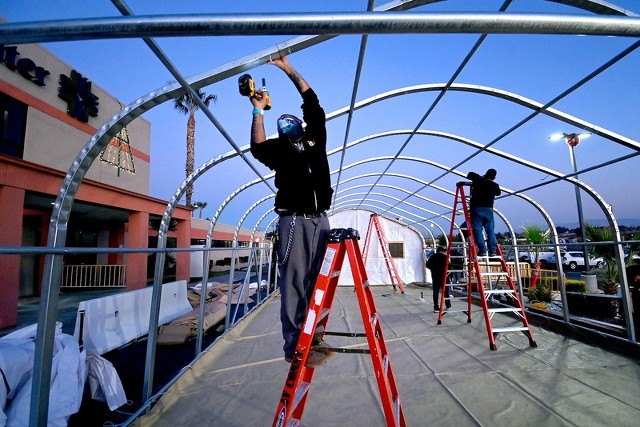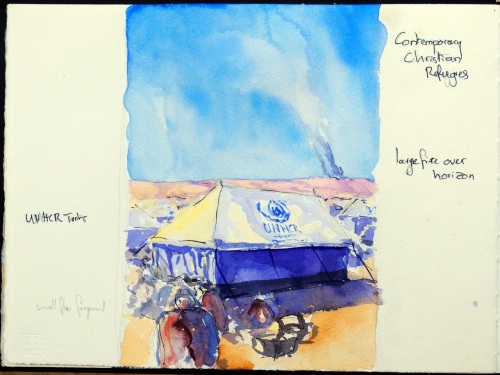
A Sermon for the Fourth Sunday of Advent. Preached 20 December, 2020, via Zoom to the Parish of All Saints, King City, Ontario, the Anglican Diocese of Toronto. Texts for this Sunday: 2 Samuel 7.1-11, Psalm: Canticle 18 The Magnificat, Romans 16:25-27, Luke 1:26-38.
" I have not lived in a house since the day I brought up the people of Israel from Egypt to this day, but I have been moving about in a tent and a tabernacle.” (2 Samuel 7.6)
So once again we gather by Zoom, as the coronavirus once again banishes us from our church. It may feel like we’re in a kind of exile, cut off from the sacraments, apart from one another, our community of All Saints dispersed. Strange to think of a Christmas without the church full of families, their out of town members gathered together again, holding candles and singing Silent Night.
We’ll miss all that, just as we missed Easter, and just as we missed so much more this year. But don’t worry. We haven’t left God behind, locked up in All Saints until we can visit him again. God isn’t waiting for us in a closed and silent church. That’s not God’s way, as the Christmas story reminds us.
We’ll get to Mary and the angel in a moment, but first let’s give some attention to our first lesson. King David has vanquished his enemies and things are going well for him, comfortably settle in his palace, until he remembers that God is outside, “in a tent” (2 Sam 7:2). So David plans to build God a proper church, a fine temple, and is presumably quite pleased with himself, but that night God troubles the dreams of his counsellor, the prophet Nathan, and says “did I ever ask you to build me a house?”:
“Thus says the Lord: Are you the one to build me a house to live in? 6 I have not lived in a house since the day I brought up the people of Israel from Egypt to this day, but I have been moving about in a tent and a tabernacle.” (2 Sam 7.5-6)
The idea of a God on the move, tenting with his people, came naturally to the Jews as a nomadic people. God didn’t need a church when he led the Israelites out of slavery in Egypt. He didn’t need a church when they crossed the Red Sea just ahead of Pharaoh’s army. God didn’t need a church when he went out into the fields to find the shepherd David and make him a king. Why, says God, should I need a church now? Did I need a church to save you guys?
The story of Israel since then is a cycle of temples built, temples destroyed, exile, return, and rebuilding. Jesus stands before Herod’s second temple in Jerusalem and warns the disciples that the cycle will continue and this temple too will be torn down (Mt 24: 1-2). What the disciples don’t realize as they listen to Jesus is that they are looking directly at the Word made flesh, the Son of God living and dwelling amongst them in Jesus the man.
At the beginning of John’s gospel, in that lovely phrase “the Word became flesh and dwelt among us” (Jn 1.14), the verb in Greek that the King James version translated as “dwelt” is “skenoo”, meaning “to tent”. It’s the same word, and the same meaning, as Nathan hears in his dream from our first lesson, of God “tenting” with his people (ἐν σκηνῇ).
In saying yes to the angel, Mary gives her womb to serve as a tent of flesh, a temporary dwelling for the God who is coming into the world. In choosing this humble girl from a backwards village, God signals his determination to send Jesus to dwell among the poor and downtrodden, the poor and the ignored. Jesus, the tenting God, will shortly travel with the holy family as they flee Herod, taking the road that countless refugees have taken since then.
This morning, as I breakfasted comfortably and safely in my bed, I read of hospitals so overwhelmed by those sick and dying of the coronavirus they are setting up tents to serve as a triage space for those racked by coughs and short of breath. Surely the God of tents and tabernacles will be moving in tents such as these, just as the poet Malcolm Guite described the Jesus of this Easter, trading the locked down and empty churches and going to hospitals
“To don his apron with a nurse: he grips
And lifts a stretcher, soothes with gentle hands
The frail flesh of the dying, gives them hope,
Breathes with the breathless, lends them strength to cope.”

(Photo - https://www.washingtonpost.com/graphics/2020/national/california-hospital-covid-capacity/)
This Christmas season, I see Jesus in other places where the tents are humble and cold. I see Jesus in the encampments and tarp villages of the homeless. I see Jesus in refugee camps and detention centres across the globe, where, to quote another Malcom Guite poem, he “pitch[es] his tent in our humanity”.

So yes, this Christmas, Jesus is not in the dark and empty churches. Our tenting God is where he always is: in the shelters and prisons where few care if the poor get the virus, in the long term care homes where the families can’t visit, in the homes of of the widow, the widower, the lonely. Our tenting God, who willingly entered the womb of a humble girl to give dignity to all humanity, is in all these places and more. Let the churches rest and await our joyous return. Until then, Jesus is where he needs to be.
MP+


No comments:
Post a Comment